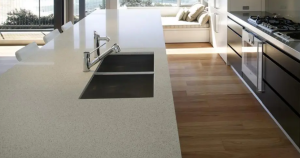Understanding the Heat Resistance of Quartz
Quartz countertops are renowned for their durability and beauty, making them a top choice for many homeowners. However, when it comes to heat resistance, it's important to understand just how much temperature quartz countertops can handle before becoming susceptible to damage such as warping or discoloration.
Maximum Temperature Threshold
Heat Tolerance Limits
Quartz is engineered from natural quartz mixed with polymer resins. These resins bind the stone particles together but are also the reason quartz can be vulnerable to high temperatures. Generally, quartz countertops can withstand temperatures up to about 150 to 300 degrees Fahrenheit. Beyond this range, the risk of damage increases significantly.
Effects of High Heat Exposure
Exposure to temperatures higher than what quartz can handle can lead to thermal shock. This sudden change in temperature can cause the resin to melt and the countertop to crack. For instance, placing a hot pan directly from the stove or oven onto a quartz surface is likely to cause such damage.
Preventative Measures for Heat Exposure
Using Protective Barriers
To safeguard quartz countertops from heat damage, always use trivets or hot pads when placing hot items on the surface. These barriers prevent direct contact with heat, thereby preserving the integrity of the quartz.
Culinary Best Practices
Additionally, it’s wise to avoid placing heated appliances directly on quartz surfaces. Items like crockpots or electric griddles can exceed the temperature tolerance of quartz if left on the countertop for extended periods.

Longevity and Performance Under Heat
Durability Despite Challenges
Despite these precautions, quartz is still highly praised for its overall durability. It resists scratches, stains, and corrosion effectively, maintaining its appearance over time as long as it is properly cared for and not exposed to extreme temperatures.
Explore More About Quartz’s Durability
For more detailed information on how quartz performs under various conditions, including its heat resistance, visit what temperature can quartz withstand. This resource provides a comprehensive look at the resilience of quartz against everyday kitchen challenges.
Key Takeaways
It is crucial for homeowners to understand that while quartz countertops are resistant to many forms of wear and tear, they are not indestructible when it comes to heat. The best practice is always to use caution and protective measures to ensure your quartz surfaces remain pristine and undamaged from heat exposure. Proper care will extend the life and beauty of your quartz countertops, making them a lasting addition to your kitchen or bathroom.
